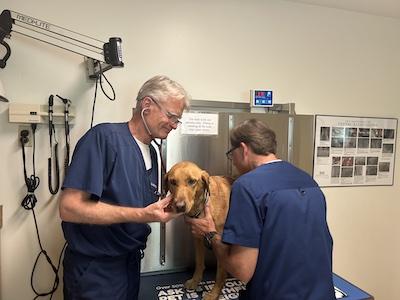
Our goal is to prevent illness whenever possible or to detect abnormalities early so that intervention can result in cure
A regular exam is just as important for our pet as it is for us. The doctors at Switzerland Animal Hospital recommend a comprehensive physical exam once a year for healthy pets and twice a year for our geriatric patients (dogs over 6 years of age and cats over 8 years of age) and all pets with chronic health problems. Remember that our pets age between 5-7 years for every human year. This means that their health can change significantly in a 12-month period. A comprehensive exam consists of a thorough inspection of nose, ears, eyes, teeth, and oral cavity. We listen to your pet’s heart and lungs, look for any skin lesions or changes in the lymph nodes, palpate abdomen, muscles, and perform an orthopedic evaluation of the bones and joints.
Our goal is to prevent illness whenever possible or to detect abnormalities early so that intervention can result in cure. Our annual wellness visit includes intestinal parasite testing, heartworm and flea prevention, age appropriate vaccines and blood tests.
Vaccinating your pet is safe and well worth the investment. Many of the vaccines we use at Switzerland Animal Hospital have a duration of 2 to 3 years. In deciding which vaccines are needed, we follow the recommendations of the American Veterinary Medical Association and the American Academy of Feline Practitioners and consider the individual needs of your pet. Vaccines are typically started at 6 to 8 weeks of age. They are boostered every 21 days, and typically finished by the time your pet is 16 weeks old. These visits with your “furry friend” also give us an opportunity to address behavioral and nutritional issues and provide guidance where necessary.
SENIOR WELLNESS (GERIATRIC PETS)
The field of veterinary medicine has changed dramatically over the years. Great strides have been made in recognizing the special needs and requirements of our geriatric patients. When is your pet considered a senior citizen?
9 yrs Small and medium dogs (
7 yrs Large dogs (51-90 lbs)
6 yrs Giant breeds (over 90 lbs)
8 yrs Cats
If your pet falls into one of these categories he or she is now considered a senior citizen and may have special needs or hidden diseases. A thorough diagnostic workup will help us determine your pet’s health status. This may involve specialized blood and urine testing, electrocardiogram, blood pressure measurement, radiographs, and ultrasound.
PERMANENT PET IDENTIFICATION – MICROCHIPPING
Each year, millions of pets go missing and many are never found again. A microchip can help locate your pet in case he gets lost. A microchip is a tiny device the size of a grain of rice containing a unique code. It is implanted underneath the skin between the shoulder blades as easily and painlessly as a vaccine. If a lost pet is found, a special scanner can be used by a veterinarian or animal shelter to read the code. A national registry then matches this code to your pet.
